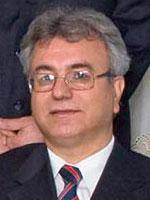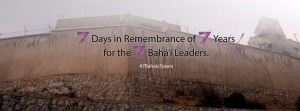* Clearly, he had to be stopped!
Mr. Rezaie was the fifth of the seven “friends” (Yaran) who had taken on the job of looking out for the needs of the oppressed Baha’i community in Iran, the land of its birth. In the past few decades, their elected councils have been outlawed, their reputations slandered, their businesses shuttered, their youth deprived of education, all in the wake of the execution of hundreds of believers following the “Islamic” revolution in 1979. Even the Yaran, voluntary leaders of the oppressed community, were arrested, and Mr. Rezaie and his colleagues are now halfway through their eighth year of unjust imprisonment in two Iranian jails. He — and his six partners in the most benevolent, world-minded sorts of “crime” you could imagine — were the focus last May for the international #7Bahais7Years campaign, and this was my homage to Mr. Rezaie. The Seven are enemies of an insecure state simply because of their membership in a community enduring nearly two centuries, now, of slander and persecution in their homeland.
Now it’s November, half a year of imprisonment later, and the tragic, heroic and under-reported story of the Quietly Magnificent Seven, prisoners of conscience in Iran for a week of years, is still a burr under my saddle. So here’s what I said, and here’s what I say:
*****
Agriculture is quite old-fashioned. Who needs it? Who even cares? It’s as if we’ve gotten so modern and giga-groovy that we don’t have to think about food production at all, and if we do, chances are it’s not much more than a glimpse: an idyllic image of a family farm on some supermarket packaging, an image that bears about as much relationship to modern agriculture as fish do to fish sticks.
I have my own agri-romantic fantasies. I want to be a farmer. I was a happy man today with a shovel, a rake and a barrow — no wheel — in my tiny backyard garden. Maybe this comes from raking and draining ball diamonds to get ready for my team’s next youthful pitching and catching and swings of the bat. Certainly it comes from growing up in a little town with two old mills within, and endless fields of corn, hay and soy all around it. Our town fair featured — for a few years among the usual tractor and biggest-pumpkin displays, greasy food and clunky rides, the Baptist Church pies and the demolition derby — an earnest group of idealists celebrating the notion that “The Farmer Comes First”. (Always liked being first, I did, but my farm dreams are a rather unlikely route to victory. I digress.)
This advocacy for the preeminent importance of the farmer was, even then, a relatively doomed notion, as more and more of us became city-dwellers and ever more remote from the reality of food. (Never mind where babies come from – where does chicken or Cheez Whiz come from?!) And yet, it’s still a concept that we might find useful, this making-sure-we-can-feed-ourselves-not-just-cheaply-but-healthily-and-sustainably thing. Y’know, the small stuff.

Maybe just my imagination again, but this man looks ready to grin at the least provocation. I hope he still can.
Which brings me, in a not entirely roundabout way, to Saeid Rezaie. Mr. Rezaie is 57, and therefore old enough to have gotten his degree in Agricultural Engineering before the Islamic Revolution made it illegal for Baha’i students to attend university. He started a farm equipment business in the mid-80s, which endured through increasing harassment; for certain periods he had to relocate to more remote parts of Iran, managing farms or even doing carpentry and odd jobs. When he was finally arrested in 2008, his business collapsed. (Too bad for you, farmers.)
And your would-be gentleman farmer and current correspondent couldn’t help noting: Rezaie was a fine scholar, the author of several books and a promoter of education among the disenfranchised youth of his community. But here’s my (least) favourite fact of the Saeid Rezaie story: his daughters, the oldest of his three children, were arrested in ’06 in a government sweep of dozens of youth. The “crime”? They were conducting a Baha’i-inspired literacy program for poor kids. Their punishment? Rezaie’s daughters were forced to attend a three-year-long class in Islamic education. That’ll teach ‘em! (If they were like Baha’is I have known or heard about, they probably aced the course and smiled.) His son was 12 in 2008 when he was arrested. I’ve read and written this story too often.
You can see what an ongoing danger, then, Saeid Rezaie and his family and his kind represent to the peace and stability of Iran. Compared to the dark-magical processes that pass for governance and justice in that afflicted nation, my vain imaginations about being a farmer look downright LOGICAL. 

I love Iran; in fact, I love it so much I want to go back there again later this year. It may shock some of your readers to realize, James, that the Bab and Baha’u’llah, the Prophet-Founders of the Baha’i Faith, were chosen by God to reveal His newest message to humankind in the most benighted land on earth – then (1844) and now – IRAN. The Iranians are among the most hospitable people on earth, but the leaders of their theocracy are responsible for the deprivation of all those residing there.